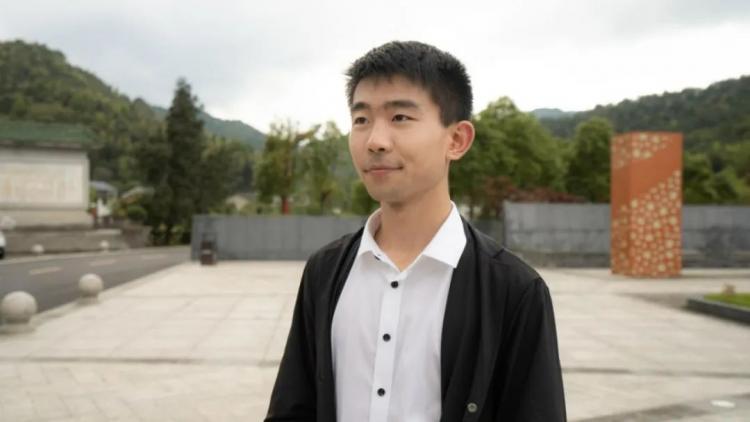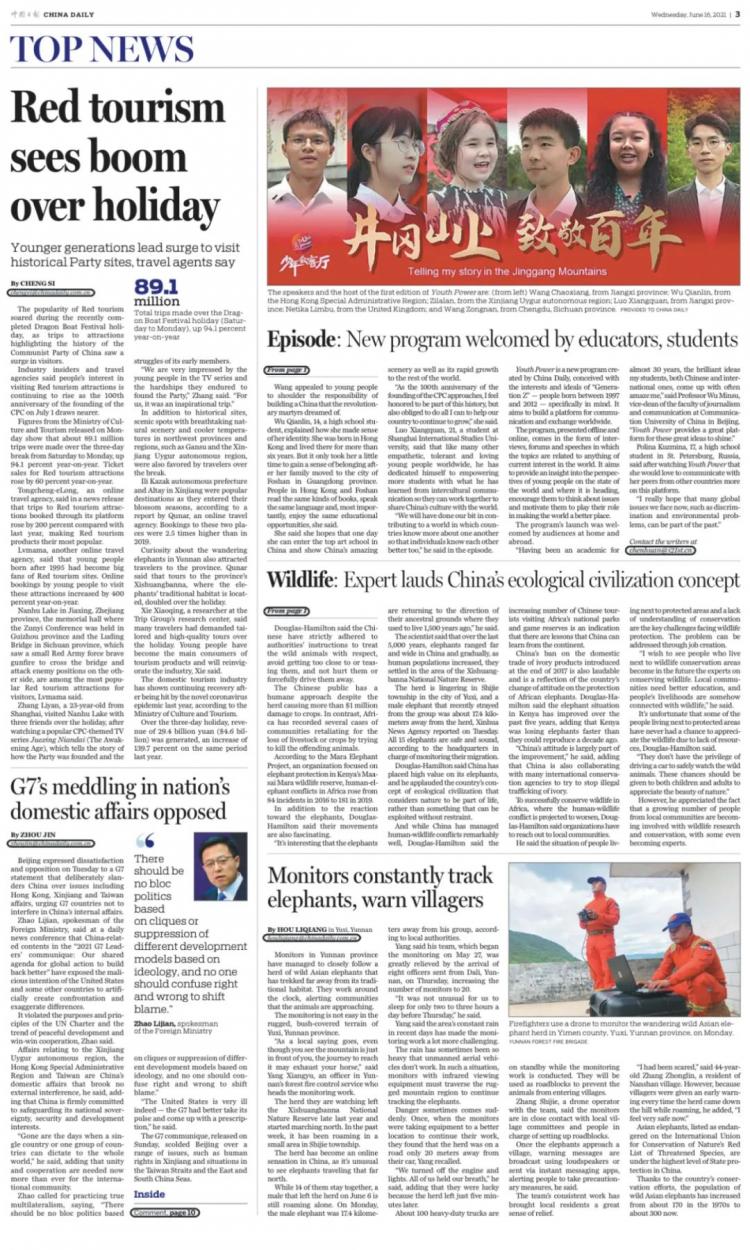井冈山上 致敬百年 | 上外本科生罗相荃:积跬步至千里,传声音至远方

2021-06-19 10:00 浏览量: 2316
 智能总结
智能总结编者按:“曾经,我一心只读圣贤书;如今,我想向外国人介绍中国,让世界听到我们的声音、理解我们的思想。”上海外国语大学本科生罗相荃借助英语演讲,迎接和庆祝建党百年,向世界发出中国的声音,发出我们的声音。...
编者按:
“曾经,我一心只读圣贤书;如今,我想向外国人介绍中国,让世界听到我们的声音、理解我们的思想。”上海外国语大学本科生罗相荃借助英语演讲,迎接和庆祝建党百年,向世界发出中国的声音,发出我们的声音。
作为上外卓越学院多语种高级翻译人才实验班/西班牙语专业三年级学生,罗相荃获得“21世纪杯”全国大学生英语演讲比赛上海赛区决赛冠军,并受邀参与了此次中国日报创办的“少年会客厅”节目。
为迎接和庆祝中国共产党成立100周年,中国日报创办的“少年会客厅”首期节目于6月15日正式上线,罗相荃在节目中发表了英语演讲。(视频截取于China Daily)
以下内容为罗相荃同学中英文演讲稿全文:●●●●●
曾经,一位名叫埃德加·斯诺的美国记者一直梦想着踏上我所站立的这片土地。1936年,斯诺造访中国,与红军一起度过了四个月的时光。毛泽东告诉他,井冈山对于中国革命意义非凡。1937年,斯诺出版了《红星照耀中国》,讲述他和红军相处的日子,讲述他眼中的共产党人。斯诺的书向西方介绍着中国的形势,此时西方对这个国家还知之甚少。此书在伦敦十分畅销,短短几周内就售出超过十万册。即使三次追加印刷,仍然十分紧俏。遗憾的是,斯诺没能来到神圣的井冈山。更遗憾的是,在他去世近50年后,他努力让西方了解中国的使命仍未完成。我意识到这一点,是在两年前。当时我正在荷兰参加一个暑期学校项目,认识了来自世界各地的同学。经过交流,我惊讶地发现,他们对中国知之甚少。我的室友来自美国北卡罗来纳州,他只知道一个中国城市——上海,甚至不了解中国的首都是北京。相比之下,我却对美国有足够的了解,还能在地图上指出他的家乡。这段经历改变了我:曾经,我一心只读圣贤书;如今,我想向外国人介绍中国,让世界听到我们的声音、理解我们的思想。英语演讲赋予我做到这一点的能力,并且我希望能通过雄辩的口才去更好做到这一点。有一次,在一场英语演讲比赛后,一位外国评委告诉我:“在所有参赛者中,你是让我真正能够产生共鸣的选手,因为你用平实易懂的语言呈现了宏大深邃的想法。”我意识到,从一个外国人的角度出发思考如何讲述中国故事是多么重要。我们应该展现一幅幅鲜活的画面,而不是单纯地叙述;我们应该潜移默化地影响,而不是一板一眼地说教。只有这样,我们才能积硅步至千里,让我们的声音到达更远的地方。这就是斯诺的伟大事业——努力团结中国和其他国家。而要完成这未竞之业,取决于中国人自己,更取决于中国的年轻人。

《中国日报》(China Daily )6月16日头版、第3版报道本次活动
Speak up for China
I’m now standing on the ground on which a man named Edgar Snow had always dreamed of setting foot. Snow was an American journalist who traveled to China in 1936 and spent four months with the Red Amy and its leader Mao Zedong, who told him about the great significance of the Jinggang Mountains in the revolutionary struggle in China.In 1937, Snow published a book telling of those days and of his observations of the Communists, as a way of telling people in the West what was going on in China at a time when knowledge of the country was extremely limited. The book was a bestseller in London, with more than 100,000 copies sold in just a few weeks, and was still much sought after following three more print runs.The thing is that just as Snow never did go to those hallowed Jinggang Mountains, almost 50 years after he died his mission of trying to get the West to understand China remains unfinished.I learnt that harsh truth two years ago when I took part in an international summer program in the Netherlands. There I met students from all over the world and was surprised to find out how little they knew about China. My roommate, from North Carolina, did not know what China’s capital city is and could name only one of the country’s cities, Shanghai. By contrast, I knew enough about the United States to be able to point out on a map where he came from. In some ways that experience changed me: from being preoccupied with learning things, I started to want to explain China to non-Chinese so our voice could be better heard and understood.English public speaking allows me to do just that, and I would like to think that I do it with a certain degree of eloquence. Once after an English-speaking competition a foreign judge told me, “Among all the contestants, you’re the one I can really identify with, because you present broad ideas in an easily understood way.” From that I learned how important it is to put oneself in the shoes of non-Chinese. It’s better to show rather than tell, to influence rather than to preach. Only in this way, little by little, can our voices reach farther.Snow did an amazing job in trying to bring China and the rest of the world closer together. It is up to Chinese – especially young people – to carry on that task in any way we can.At college I have encountered many like-minded people who have decided to go global as they show and influence. I know of a Chinese student who was studying Spanish in Mexico when a huge earthquake struck. Without hesitation he joined the international rescue team and threw himself into relief operations. That helped him to become part of the local community, empathizing with them in many ways despite their cultural differences.Then there is the case of the Chinese student studying Portuguese in Portugal when COVID-19 broke out last year. She was angered by the vitriol aimed at China from some quarters at the time, and rather than ignore it, she did something concrete: she wrote an opinion piece for one of Portugal’s leading newspapers imploring people to be rational in the way they treat any area touched by the virus.In multinational corporations or in journalistic work, through diplomatic activities or at large-scale conferences, those with language skills can play a crucial role in pulling down communication barriers and facilitating collaboration.I know young people everywhere are drawing on empathy, tolerance and love so that we all connect better with one another. For me, I have dedicated myself to empowering more students with what I have learnt from intercultural communication and making it easier for them to tell our great stories and share our culture with the world.By doing this kind of thing, like Edgar Snow we will have done our bit in contributing to a world in which countries know more about one another and so that individuals know each other better too.
来源|中国日报
作者| 罗相荃
编辑|夏露


●●●●●
阅读上外多语种资讯,欢迎访问
http://global.shisu.edu.cn
© 上海外国语大学微信公众平台
编辑:刘蕊
(本文转载自 ,如有侵权请电话联系13810995524)
* 文章为作者独立观点,不代表MBAChina立场。采编部邮箱:news@mbachina.com,欢迎交流与合作。
备考交流
最新动态
推荐项目
活动日历
2025年度
- 01月
- 02月
- 03月
- 04月
- 05月
- 06月
- 07月
- 08月
- 09月
- 10月
- 11月
- 12月
- 08/02 复旦MBA 8月公开课暨招生宣讲会 | 活动报名
- 08/02 【预告| 8.2北大国发院EMBA体验日】黄卓:稳定币与数字货币:全球金融市场的新世界
- 08/02 上海场 | 清华-康奈尔双学位金融MBA项目上海场招生说明会报名中!
- 08/02 文旅时代 智创未来丨2026年南开大学MTA项目招生说明会(北京专场)重磅启幕
- 08/03 【复旦公开课】全球贸易中的政策博弈:中美欧绿色能源产业的历史比较与启示丨AMF
- 08/05 直播预告 | 北大汇丰MBA教授主题讲座暨招生说明会
- 08/07 报名 | “品牌全球化×跨文化影响力”复旦-BI MBA教授公开课暨招生宣讲会
- 08/07 锁定8月7日 | MBM2026级招生说明会,预见更好的自己!
- 08/09 复旦MBA北京招生见面会邀您共探AI时代新机遇
- 08/09 报名|从医生到药企高管,跨界多年的他为何还要选择科技金融MBA?
展开


















